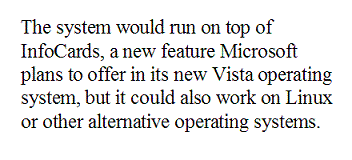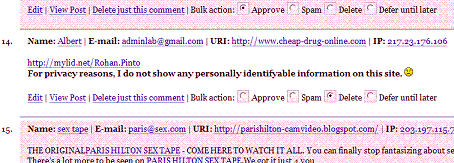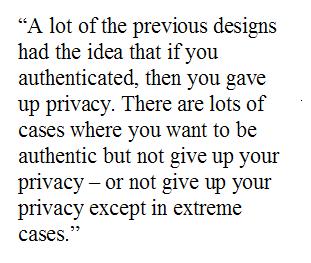I've assembled a list of some of the articles that appeared this week after Bill Gates’ keynote at the RSA security conference in San Jose.
Verisign's announcement of support also played a big role in driving home the message that InfoCards are part of an open identity metasystem reaching across platforms. As more people announce support, this part of the message will be strengthened.
The collection I have put together is far from complete, and not edited for content except to cut out all the articles which can only be read by entering a password (I just can't bear them). The idea is to show the kind of dynamic we can get going if all of us work together .
I really believe we have a unique opportunity at a precious moment in time. I hope all of us, throughout the industry, can benefit from and help create a tantalizing technology wave where privacy-based applications aware of identity open a million new possibilities for innovation and great new experiences.
The momentum which we are gaining can be extended and transformed, becoming a glow that radiates from every company in the industry.
Let's work together on giving digital identity a real architecture that will light the fire of web services.
Microsoft pushes InfoCard for secure online ID – Todd Bishop, 02-14-2006
Seattle Post-Intelligencer, Sci-Tech Today, MSNBC News Services, Top Tech News
Gates sees end to passwords in sight – Joris Evers and Ina Fried, 02-14-2006
CNET Nws.com, The New York Times, ZDNet, ZDNet Australia
Microsoft unfolds next generation authentication – Tom Sanders, 02-14-2006
vnunet.com, Computer Active Online, Computing UK, What PC UK, Computeractive
Gates calls for better computer security – Timothy Roberts, 02-14-2006
San Jose Business Journal, Silicon Valley/San Jose Business Journal, East Bay Business
Times, San Francisco Business Times, Puget Sound Business Journal, Daily News
and Analysis
Gates Outlines Computer Security Efforts – Matthew Fordahl, 02-14-2006
Associated Press, The Monterey County Herald, Inland Valley Daily Bulletin, Bradenton Herald, The Macon Telegraph, Belleville News-Democrat, Journal Gazette, Durant Daily Democrat, Press-Enterprise, The Tribune-Democrat, Centre Daily Times, Ottawa Sun, Grand Forks Herald, Pittsburgh Post-Gazette, The Washington Post, Boston Herald, Houston Chronicle, The Charlotte Observer, The State, Fort Worth Star-Telegram, San Jose Mercury News, St. Paul Pioneer Press, Sacramento Bee, The News & Observer, Columbus Ledger-Enquirer, Casper Star-Tribune, North County Times, The Globe and Mail, Contra Costa Times, The Ledger, The Herald, KCCI-TV, KETV-TV, Forbes.com, BusinessWeek Online, MSN Money, detnews.com, timesunion.com, Kansas.com, Kentucky.com, phillyburbs.com, The Norman Transcript, cbs5.com, click2houston.com, kesq.com, kgw.com, kcra.com, nbc11.com, king5.com, wesh.com, newsnet5.com, ktvu.com, local6.com, wral.com, nbc4.com, koin.com, komotv.com, MSNBC.com, NewsFactor.com, Canada.com, New Mexico, Gameday, Daily Journal, CIO Today, SiliconValley.com, Los Angeles Times, Montreal Gazette, Pioneer Press, wjactv.com, wtov9.com, kfoxtv.com, foxreno.com, nbc13.com, The Canadian Press, Journal Gazette Company(The), Biloxi Sun Herald, San Luis Obispo Tribune, Myrtle Beach Sun News, Duluth News Tribune, Milwaukee Channel.com, Hawaii Channel.com, INDYchannel.com, Boston Channel.com, Click10.com, Lakeland Ledger, News Factor Network, ChamplainChannel, San Diego Union Tribune, Worcester Telegram, Record-Searchlight, ABC Newspapers, WPBF-TV, Inside Bay Area, Malaysia Star, NW Indiana Times, Cnews, Jackson Channel, WBAL Channel, IT News Online, erald News Daily, Leading the Charge, Playfuls.com, Top Tech News, Mainichi Daily News, Pierceland Herald, New Mexico Channel, Mumbai Mirror
Gates Issues Call to Action for Security – Nathan Mook, 02-14-2006
BetaNews
Gates Says Security Is Job One For Vista – Aaron Ricadela, 02-14-2006
InformationWeek
Microsoft promises Passport redux with ‘InfoCards’ – Ashlee Vance, 02-14-2006
The Register, Computer Crime Research Center
InfoCard on the way from Microsoft – Nate Anderson, 02-14-2006
Ars Technica
Reporter's notes from the RSA conference – Jaikumar Vijayan, 02-14-2006
Computerworld
Gates’ latest vision brings controversy – Richard Waters, 02-14-2006 (subscribers only)
Financial Times
RSA: Gates outlines ID management for Vista, XP – Elizabeth (Liz) Montalbano, 02-14-2006
IDG News Service, CRN, Network World, InfoWorld, PCWorld.com, ITworld.com, Techworld, PC Advisor (Online), ARNnet.com
Microsoft, RSA, Sun And Encryption – Erin Joyce, 02-14-2006
internetnews.com, DevX.com, Inc.
Gates calls for the end of passwords – Bill Brenner, 02-14-2006
TechTarget, searchCIO.com
Gates discusses security protections at S.J. conference – Jessie Seyfer, 02-14-2006
San Jose Mercury News, Bradenton Herald, The Kansas City Star, The Charlotte Observer, Kentucky.com, Ledger-Enquirer.com, GrandForksHerald.com, SiliconValley.com, Pioneer Press, Biloxi Sun Herald, San Luis Obispo Tribune, Duluth News Tribune, Express India
Gates says security boils down to four focus areas – John Fontana, 02-14-2006
Network World, Computerworld
Gates Pushes Maximum Security – Katie Dean, 02-14-2006
TheStreet.com
Gates Outlines Microsoft's Security Vision – Luc Hatlestad, 02-14-2006
VARBusiness, CRN
Beyond Microsoft Passport Is InfoCard – Staff Writer, 02-14-2006
NewsFactor.com, CIO Today
Microsoft Wants Zero Passwords – Staff Writer, 02-14-2006
Red Herring
Gates Outlines Vista Security Features – Staff Writer, 02-14-2006
Top Tech News, CIO Today, News Factor Network
Microsoft plans virtual information wallet: Gates – Staff Writer, 02-14-2006
Reuters, The Washington Post, Boston Globe, The New York Times, The Australian IT, CNN International, TVNZ, News24, Reuters UK, CIOL IT, IT News Australia, Reuters India, Reuters Canada, CRN Australia, Herald News Daily, DNA India
Microsoft Updates Active Directory Roadmap – Stuart Johnston, 02-14-2006
Redmond, ENT
McNealy and Gates as hunting partners? – Todd Bishop, 02-14-2006
Seattle Post-Intelligencer
Microsoft talks security, InfoCard – William Harris, 02-15-2006
Bit Tech.net
Gates: Security is #1 Vista Priority – Albert Sacco, 02-15-2006
CIO
Microsoft introduces Infocard for improved security – Staff Writer, 02-15-2006
24X7
Bill Gates Plans On Replacing Passwords With ‘InfoCard’ – Staff Writer, 02-15-2006
All Headline News
Gates unveils ID security tool ‘Infocard’ – Abdul Salaam Masheer, 02-15-2006
EarthTimes.org
Microsoft Finds Unlikely InfoCard Ally – Ryan Naraine, 02-15-2006
eWeek, The Channel Insider, Neowin.net
Microsoft specs out InfoCard security credentials – Staff Writer, 02-15-2006
Finextra
Security Isn't "One Size Fits All" – Larry Greenemeier, 02-15-2006
InformationWeek, CRN, Security Pipeline
The oldest question in IT – Tom Sullivan, 02-15-2006
InfoWorld
Sparks of Life (and Green) in Smart Cards – Erin Joyce, 02-15-2006
internetnews.com
Keynoters push for ID federation, harsher laws – Annet Saita, 02-15-2006
TechTarget
Windows will feature better locks – Bob Keefe, 02-15-2006
The News Tribune, Atlanta Journal-Constitution, Austin American-Statesman, Hispanic Business.com
Gates calls for better PC security – Dan Fost, 02-15-2006
San Francisco Chronicle
Microsoft pushes standardized SSO at RSA – George Ou, 02-15-2006
ZDNet
Gates Outlines Microsoft Security Strategy – Jay Wrolstad, 02-15-2006
NewsFactor.com, CIO Today, Sci-Tech Today, Top Tech News
Gates unveils new kind of PC security – Jessie Seyfer, 02-15-2006
San Jose Mercury News
Taking the pain out of passwords – Louisa Hearn, 02-15-2006
The Age, Sydney Morning Herald Business
Microsoft Developing Virtual Wallet – Nathan Weinberg, 02-15-2006
WebProNews.com
Bill Gates: RSA Keynote 2006 – Paul Krevs, 02-15-2006
Neowin.net
Gates Pushes Smart Cards To Replace Passwords – Ryan Naraine, 02-15-2006
PC Magazine
Microsoft and Sun show commitment to online security – Phil Muncaster, 02-15-2006
IT Week
Microsoft Finds Unlikely InfoCard Ally – Ryan Naraine, 02-15-2006
The Channel Insider
Gates Outlines Microsoft Security Efforts – Staff Writer, 02-15-2006
NewsFactor.com, Sci-Tech Today
Passwords a thing of the past – Staff Writer, 02-15-2006
Monsters and Critics
Bill Gates presents a new software security program – Staff Writer, 02-15-2006
Pravda.ru
Gates tries to win over skeptics on security – Todd Bishop, 02-15-2006
Seattle Post-Intelligencer
Microsoft InfoCard's first backer: VeriSign– Todd Bishop, 02-15-2006
Seattle Post-Intelligencer
Active Directory, identity management get tighter – Matt Mondok, 02-16-2006
Ars Technica
Newsmaker: Ending Microsoft's identity crisis – Ina Fried, 02-16-2006
CNET News.com, ZDNet, ZDNet India
VeriSign SSL Business Could Get Vista Boost – Kevin Murphy, 02-16-2006
Computer Business Review, CommentWire
Microsoft plans virtual information wallet to manage your online IDs – Staff Writer, 02-16-2006
DNA India
VeriSign and Microsoft tie-up to tackle phishing crimes – Staff Writer, 02-16-2006
Finextra
Calling Cryptographers – Kate Greene, 02-16-2006
MIT Technology Review Germany
Microsoft continues push for ‘InfoCards’ – ScuttleMonkey -02-16-2006
Slashdot
Bill Gates Talks about Infocard at RSA – Staff Writer, 02-16-2006
Spotlighting News
Infocard Spells End of Passwords – Staff Writer, 02-16-2006
TechTree
Gates security program would end passwords – Staff Writer, 02-16-2006
Knight Ridder Newspapers, The Charlotte Observer
Gates outlines vision for new secure Internet Explorer – Steve Malone, 02-16-2006
PC Pro Online
Microsoft security InfoCard wins key supporter – Todd Bishop, 02-16-2006
Seattle Post-Intelligencer
McNealy on the ‘hairball,’ and other tales from RSA – Todd Bishop, 02-16-2006
Seattle Post-Intelligencer
Microsoft
demos virtual wallet – Derek Sooman, 02-16-2006
TechSpot
Bill Gates’ RSA Keynote Address – Alex Muradin, 02-16-2006
SoftPedia News
Are Passwords Passé? – Paul Roberts, 02-17-2006
eWeek
Gates: Passwords Aren't Enough – Paula Rooney, 02-17-2006
CRN



 BG: No, no, it’s not even worth going back to that. We partly didn’t know what it was, and certainly what the press said it was wasn’t what we thought it was, but even what we thought it was we didn’t end up doing all of that. That’s old history.
BG: No, no, it’s not even worth going back to that. We partly didn’t know what it was, and certainly what the press said it was wasn’t what we thought it was, but even what we thought it was we didn’t end up doing all of that. That’s old history. 